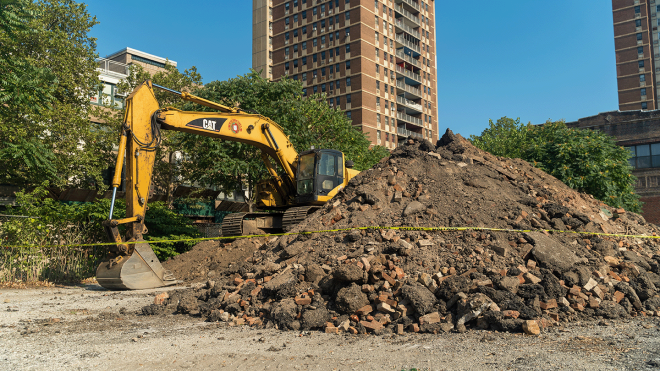Glenmore Manor Apartments HDFC
A Mix of Affordable Rental Housing for Low-Income Working Families and Permanent Supportive Rental Housing for Special Needs Homeless Families, Single Adults and Seniors

Glenmore Manor Apartments, HDFC will provide a mix of 233 units of affordable, rental supportive housing paired with wrap-around services for formerly homeless and low-income single adults, families, and seniors.
Glenmore Manor Apartments’ Mission Statement
- To provide access to clean, safe, supportive housing in a totally drug-free environment for special-needs, homeless tenants regardless of their race, socio-economic status, or sexual orientation.
- To provide clean, safe, affordable rental housing for single working adults and families.
- To ensure that each special-need tenant remains connected to treatment and obtains the best possible health outcomes, as needed.
- To provide direct and indirect services in a supportive environment.
- To empower our tenants physically, emotionally, and socially.
The Goal of Glenmore Manor Apartments, HDFC
The goal of Glenmore Manor Apartments, HDFC is to meet the immediate and long term housing needs of low-income working families and single adults from the underserved neighborhood of Brownsville, as well as the housing needs of special needs homeless families and single adult New Yorkers who seek affordable, permanent housing with onsite wrap-around supportive services. The target population includes formerly homeless veterans and survivors of domestic violence.


Unit Breakdown

Architect’s rendering of Glenmore Manor. Southwest view. From Christopher Avenue
- 70 apartments will be set aside for formerly homeless persons and/or families.
- 59 apartments will be set aside for low-income seniors.
- 104 units will be family units: one-, two-, and three-bedroom apartments set aside for low-income and community residents.
Commercial & Retail Space

![]()
Community Space
 Architect’s rendering of Glenmore Manor. Sectional perspective at B’Ville Hub
Architect’s rendering of Glenmore Manor. Sectional perspective at B’Ville Hub
![]()
Who Glenmore Manor Serves
People Experiencing Homeless
AAPCI’s work focuses on some of the most vulnerable: those experiencing homelessness, the chronically homeless, those suffering from mental illness or from debilitating medical conditions, survivors of domestic violence, and those who have developed resistance to traditional shelter.
Survivors of Domestic Violence
The mission of AAPCI’s domestic violence programs is to offer survivors and their minor children, a safe but temporary haven in which to pick up the pieces of their shattered lives. The secondary goal is to prepare families for independent living, assist them in locating permanent housing within or outside the State of New York, and to offer a host of on- and off-site supportive services that will help empower victims and minimize the root causes of domestic violence.
People Experiencing/Living With Mental Illness
AAPCI’s supportive housing offers a life-enriching alternative to both institutionalization and street homelessness. Hundreds of our clients manage serious mental illnesses while living independently in our housing, with the support of on-site case managers and linkages to appropriate care.
People Living with HIV/AIDS & Histories of Substance Abuse
With the stability of a secure home, AAPCI tenants living with chronic illnesses are able to access essential medications, manage their condition with regular preventive care, and address psychological issues that may contribute to the course of their disease.
Veterans
AAPCI has long devoted considerable resources to addressing homelessness among veterans, who on average make up about 5% of our total client base. Significant progress has been made over the past decade to end veteran homelessness, and we continue to do everything possible to reach that goal.
Families in Need of Affordable Housing
Stable, affordable housing is essential for families to grow and thrive. Edwin’s Place, AAPCI’s first affordable residence designed primarily for families with children, opened in 2020 in Brownsville, Brooklyn. Our second affordable housing residence, Glenmore Manor, is projected to open in mid-2025. More than half of our current 359 apartments provide two or three bedrooms. Our housing for families helps people coming out of the shelter system or those at risk of homelessness to find a stable and affordable home.
Low-income Working Families and Single Adults
Critical to the success of AAPCI’s housing management model is our commitment to inclusive, mixed-income communities. Rather than being marginalized in quasi-institutional settings, our formerly homeless tenants live amongst a diverse group of low-income New Yorkers.
Seniors
AAPCI is increasingly housing older adults. Over the last five years, the senior population (62 and older) within AAPCI’s permanent supportive residences has grown to represent nearly 30% of our total resident population. We continue to seek innovative ways to develop senior-specific housing for vulnerable populations.
![]()
Glenmore Manor Apts. HDFC Submenu
Hotline Phone Numbers
National Domestic Violence Hotline
1-800-799-SAFE (7233)
1-800-787-3224 (TTY)
National Teen Dating Abuse Helpline
1-866-331-9474
1-866-331-8453 (TTY)
In New York City ONLY
Domestic Violence Hotline: 1-800-621-HOPE (4673)
Crime Victims Hotline: 1-866-689-HELP (4357)
Rape & Sexual Assault Hotline: 1-212-227-3000
TDD phone number for all hotlines: 1-866-604-5350
Volunteer Adult Literacy Tutor
Become a volunteer tutor in reading, writing, G.E.D. Prep, or English as a Second Language (ESL).
Call the Literacy Partners at 646-237-0120 or visit the Adult Literacy Tutor program, or Literacy Partners. Help change lives and make New York City one of the country’s most literate cities.

